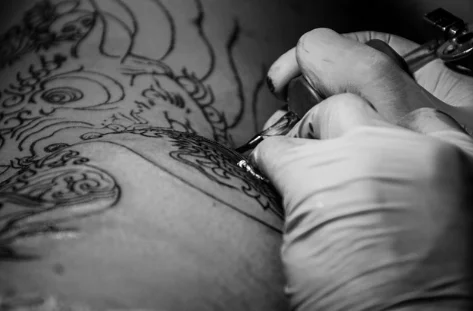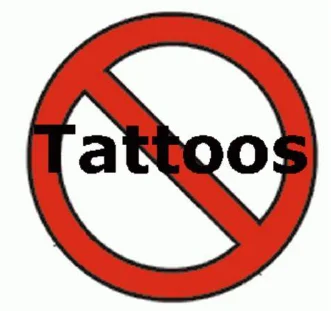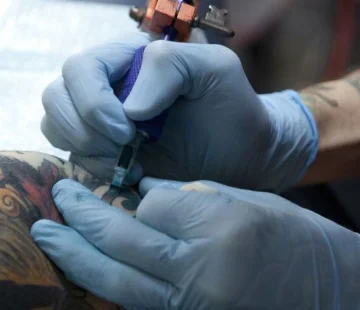Tattoos in teachers have become a controversial issue in recent decades. Tattoos are a common practice today, but it wasn’t so long ago that the idea of a teacher having tattoos was unthinkable to many people.
Let’s review whether there are restrictions on public school teachers’ tattoos.
Can Teachers have Tattoos?

The school district you work in may have a policy about teachers and tattoos, which can differ from state to state. If your school does not allow tattoos, you probably shouldn’t get one.
Teachers can have tattoos, but it’s still a personal choice. If a teacher has a tattoo, it’s not necessarily because they are trying to be rebellious or shocking — it could be as simple as the teacher wants to express themselves in their way.
If your school allows for teachers with tattoos and you want one, then you must ensure that your tattoo is not visible under clothing. Also, avoid any possible health risks associated with having an ink job on your body.
Also Read: How to Cheat on Canvas Tests: Avoid Quiz Log or Being Caught
Why Tattoos are not Allowed in Most Schools
Tattoos are not allowed in most schools because of the following reasons:
First and foremost, tattoos are unsightly. A student with a tattoo will probably not be able to get into any school without it being covered up or removed. Some schools allow students to wear them if they are part of a certain gang or if the student has been approved by their headmaster.
Second, tattoos can cause problems for other students who may be allergic to them. The school may have an allergy policy that would prevent a student from attending if they have an allergy to a certain substance on someone’s skin.
Third, some people have religious beliefs against tattoos and, therefore, would be uncomfortable having one in their presence or around them while at school.
Instances Tattoos are Allowed
1. Descent tattoos-not offensive

Tattoos, piercings, and all other forms of body modification are allowed as long as they don’t violate the University’s policies and regulations. The following are examples of how tattoos can be displayed on your body:
- An individual may have a tattoo containing religious symbols or imagery if the tattoo is not related to religion.
- A person may have a tattoo that contains words or phrases that are not considered offensive.
- One may have a tattoo that expresses political views without being offensive.
2. Good tattoos
Good tattoos are only allowed to the extent that they don’t detract from your overall appearance. If you have a good tattoo, you should be able to explain what it means and why you got it. You can also tell us about any design or symbol on your skin and why you chose it.
If we feel your tattoo is inappropriate for our community, we will ask you to remove it.
3. Religious
The main reason for this is religious reasons. Some people believe that certain tattoos are linked to their religion and should not be allowed to play or participate in any sports event, such as the Olympics or football matches.
For example, some Christians believe they cannot have tattoos on their hands because God will judge them.
Other religions have similar beliefs as well. So, therefore, I think that instances should be allowed in sports and other sports events because it would allow everyone to practice their religion without being judged by others or anyone else for that matter!
Also Read: My College Students are not Ok: Lessons from Jonathan Malesic
Tattoo Policies in Different Countries
The US

Most schools have rules against tattoos, but they often don’t apply to students who are 18 or older. A few states that have banned tattoos in schools include:
Oregon: In 2009, a school district in Portland banned students from getting any kind of body art at public expense. Students must cover up their tattoos before they graduate high school or face expulsion.
Washington: In 2009, a Washington state court ruled that a school district’s ban on visible tattoos on clothing violated the First Amendment right to free speech.
The UK
The UK has a very strict tattoo policy. The government has just passed a law that makes it illegal to get a tattoo without medical proof of consent from the person who is getting it.
The law also states that anyone convicted of body modification may be fined up to £5000 and face up to two years in prison. However, loopholes still make getting a tattoo an easy task for many people.
Europe
Tattoos are not illegal in most EU countries, except for a few specific cases, such as racist tattoos or gang markings. However, they can be punishable by law if deemed ‘disrespectful’ or ‘offensive.’
In most EU states, there are no restrictions on getting a tattoo if it is only visible from certain angles or for certain periods (such as work). Getting a tattoo on your face is also possible without any problems.
Canada
In Canada, a person 18 years old or older can get a tattoo. This means that the person has to get it done on his or her own body and not on someone else’s. The only exception is when it is done by a medical practitioner, such as a doctor.
If you want to get a tattoo in Canada, you need to follow certain rules and regulations. For example, getting your first tattoo must be done in a licensed studio with someone trained by the Canadian Association of Professional Tattooists (CAPT).
You must also follow safety guidelines and use sterile needles and ink when working with needles and ink.
The legality of Banning Tattoos in School

The legality of banning tattoos in school is debatable. However, some laws state that the dress code can be used to regulate the appearance of students in school.
Therefore, wearing a tattoo in a public place would be considered inappropriate and may result in disciplinary action.
The school dress code is not meant to prohibit any type of personal expression. It is also not meant to prevent students from expressing themselves through clothing and hairstyles.
The dress code has been designed to ensure that students’ safety will not be compromised while at school.
It is important to note that if the student’s tattoo was not visible at school, they would not have violated any laws regarding tattoos or piercings during their time at school.
Also Read: How a Professor should Dress: Tips for Lecturers, TAs & Teachers
Can You be a Teacher with a Tattoo?
As a teacher, you are expected to be professional and fit into the image of a teacher. Having a spot of ink on your body will make it difficult for you to work as a teacher. If you are considering getting a tattoo, you should think twice before getting one.
There are many reasons why teachers should not get tattoos. Here are some of them:
1) It is illegal for teachers to have tattoos in some states and countries. For example, in California or Texas, this is illegal for teachers to have tattoos on their faces or necks because it could be considered indecent exposure and result in fines or even jail time.
2) Teachers with tattoos on their faces can cause problems at school because they might have difficulty communicating with students and other adults around them when they talk about school events or activities. Many students may find it hard to understand them if a tattoo has covered their face
3) The amount of money that teachers spend on getting tattoos is often not worth what they might lose as a teacher

